calsfoundation@cals.org
Old Folks' Singing
What became known as Old Folks’ Singing started on May 17, 1885, with the dedication of a new Methodist church and cemetery in Tull (Grant County). The event was multi-denominational, with the entire community participating in the singing and midday dinner. The annual event, which celebrated its 125-year anniversary in 2010, is held in Tull at the Ebenezer United Methodist Church on the third Sunday in May. It is believed to be the oldest continuous singing day held west of the Mississippi River. While the shape-note system of learning music is no longer part of Old Folks’ Singing, the musical heritage of the event can be traced back to the shape-note singing popular in New England and moving to rural southern and western states in the mid-1800s.
The origin of the name “Old Folks’ Singing” is unknown (the earliest surviving record book is from 1921 and calls the event “Old Folks’ Singing Convention”), but an apocryphal story holds that the singing from the old Christian Harmony songbooks was done in the morning to please the elder residents. The afternoon singing consists of songs from the newer Cokesbury Worship Hymnal.
The singing is held in a morning and then an afternoon session, with a meal in between. Since at least 1921, the morning session has hosted a welcome address and a response. After the first song in the afternoon session, a memorial service is held in which a list of those who have died during the past year is read. “Happy Land” is the favorite song of the morning session, while the afternoon session’s favorite is “Awakening Chorus.”
While the singing is done inside the church, much activity takes place throughout the day on the church grounds, especially for young children who are too active to sit inside and sing all day. Although the practice ended by the 1950s when the owner of the land around the spring let the underbrush become overgrown, young people traditionally walked to (and courted by) the Ebenezer Spring a short walk from the church. A tradition that survives into the twenty-first century is walking around the Ebenezer Cemetery, which has graves dating from the early 1800s.
An important part of the day is “dinner on the ground,” a meal enjoyed between the morning and afternoon singing. In the early years of the event, people packed their own meals for the dinner, but during the Depression, large crowds showed up in hopes of being fed. The stress of about 2,000 people arriving for a meal nearly killed the tradition, but George DuVall, the first president of Old Folks’ Singing, saved the yearly event by suggesting that each woman “bring enough food for your own family and multiply it by two.” The dinner was originally served and eaten on quilts and tablecloths spread on the ground, but an incident in the 1940s involving a pig running into a five-layer coconut cake resulted in the dinner being moved onto tables ever after.
In 1936, guests began “signing the book” when they attended the event, which has created a record of who has attended over the years. KBBA radio station in Benton (Saline County) recorded portions of Old Folks’ Singing in 1955 and 1956.
Famous professor and folklorist John Quincy Wolf attended the event in 1963, remarking, “As the old folks die the interest in the old style decreases. The prospects for survival are not good, but it is difficult to kill a seventy-seven-year-old tradition.” However, the event has persisted. It today serves as a kind of reunion for people who have moved away from the area or who have relatives there. Although this may not have been the tradition in earlier years, the welcome address is given by a Tull resident and the response address is given by someone who has moved away.
Old Folks’ Singing is governed by a president, vice president, secretary, treasurer, and chaplain. A planning committee arranges the details of the day, including inviting people to deliver the welcome and response addresses.
For additional information:
Old Folks’ Singing Collection. Butler Center for Arkansas Studies. Central Arkansas Library System, Little Rock, Arkansas. Finding aid online at https://cdm15728.contentdm.oclc.org/digital/collection/findingaids/id/6417/rec/1 (accessed February 23, 2024).
Old Folks’ Singing Planning Committee. Blest Be the Tie that Binds: 125 Years of Old Folks’ Singing in Tull, Arkansas: 1885–2010. Benton, AR: 2010
Ali Welky
CALS Encyclopedia of Arkansas
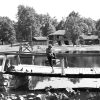 Recreation and Sports
Recreation and Sports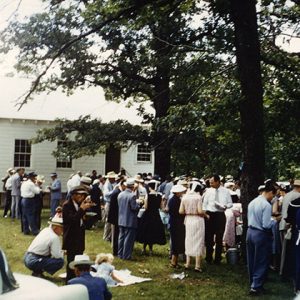 Dinner at Tull during Old Folks' Singing
Dinner at Tull during Old Folks' Singing 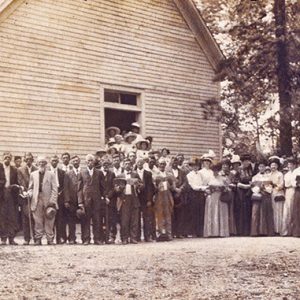 Old Folks' Singing
Old Folks' Singing 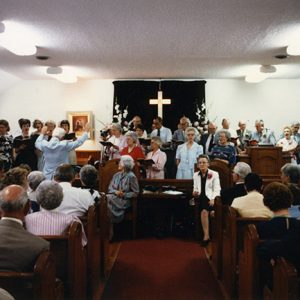 Jimmy Powers
Jimmy Powers 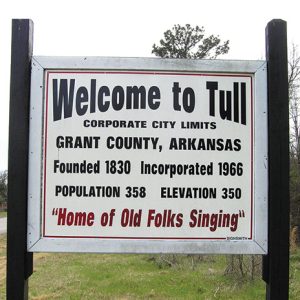 Tull Welcome Sign
Tull Welcome Sign 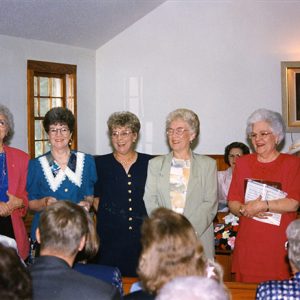 The Tulltones
The Tulltones 




Comments
No comments on this entry yet.